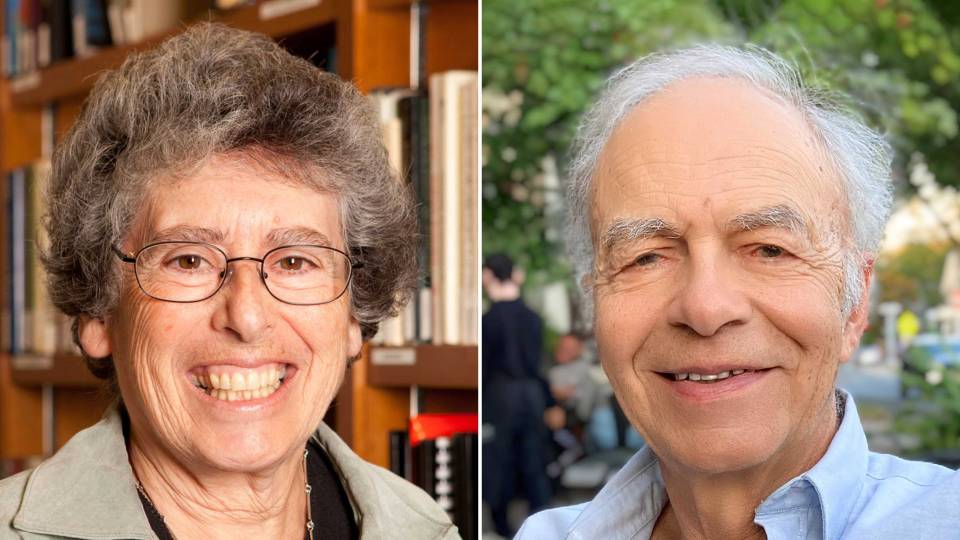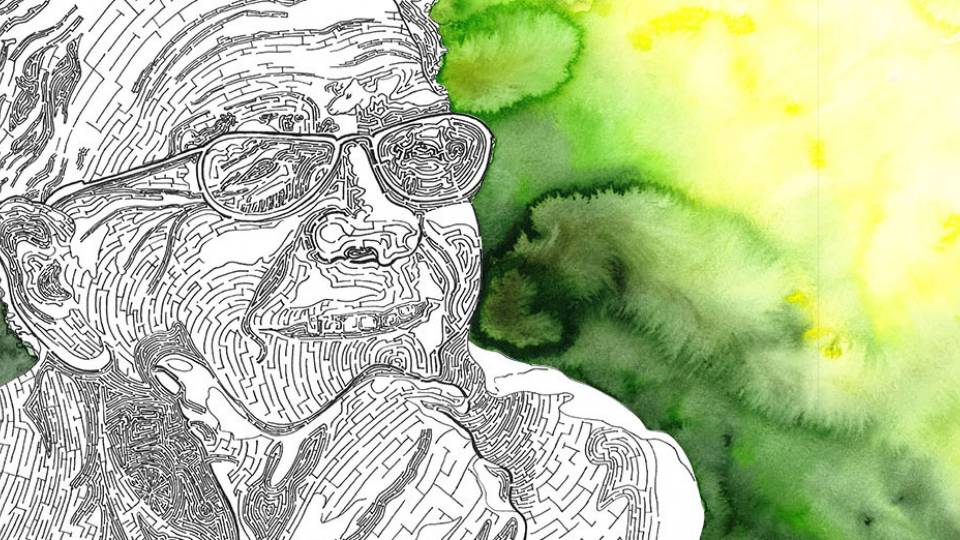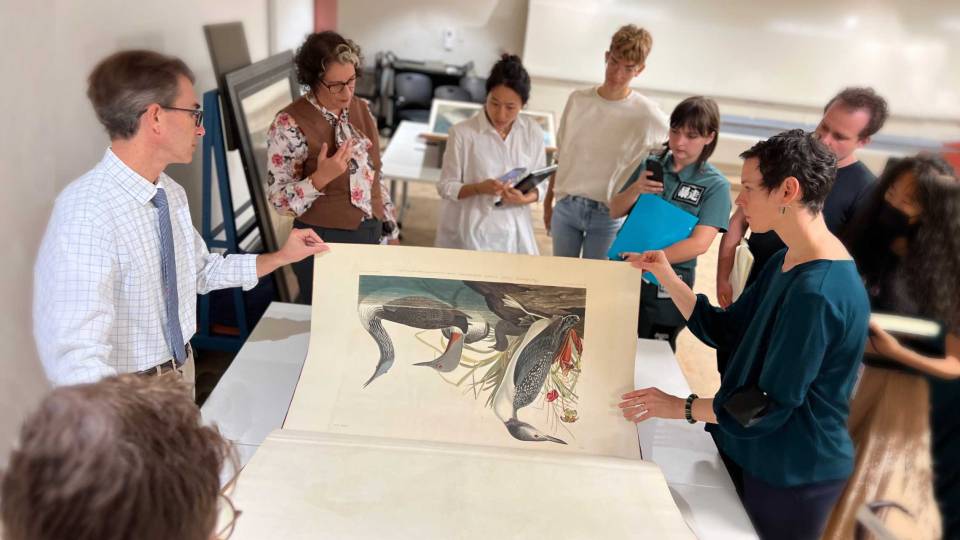Princeton professors Rachael DeLue and Peter Singer have received the University’s 48th annual Howard T. Behrman Award for Distinguished Achievement in the Humanities.
Rachael DeLue

Rachael DeLue
DeLue is the Christopher Binyon Sarofim '86 Professor in American Art, professor of art and archaeology and American studies, and chair of the Department of Art and Archaeology. She is jointly appointed in the Effron Center for the Study of America, and an associated faculty member in the High Meadows Environmental Institute, the Native American and Indigenous Studies Initiative, and the Program in Media and Modernity. She joined the Princeton faculty in 2005.
"Rachael is one of the great humanists in our University community who is deeply impactful in the undergraduate classroom, beloved by the graduate students she mentors, a powerful scholar and researcher, and someone of unusual if not unique service to the very importance and vitality of the humanities at Princeton," wrote one colleague who nominated DeLue for the Behrman Award.
Another colleague wrote: “The humanities are central to Princeton's mission, and I know of no colleague who has advocated more forcefully and persuasively for them."
DeLue specializes in the history of knowledge in Europe and North America with a focus on intersections between art and science. In 2013, she helped co-design "America Then and Now," a team-taught introductory course for American studies, Asian American studies and Latino/Latina studies at Princeton. The course regularly draws nearly 200 undergraduates, who study historical and contemporary novels, poems, film, songs, paintings and archival documents.
To acclimate students to objects and materials for academic research, DeLue’s courses regularly include visits to museums in New York and Philadelphia, along with works from Princeton’s art museum. To underscore the importance of place, she has taken students far from campus — her graduate seminar, “Terrains of Knowledge,” included a trip to Utah’s Great Salt Lake and Robert Smithson's earthwork "Spiral Jetty" — but also close to home. An undergraduate course she co-taught with Nathan Arrington included a survey and excavation of the Princeton Battlefield.
DeLue is the author of "George Inness and the Science of Landscape" (2004), "Landscape Theory" (2008, co-edited with James Elkins), and "Arthur Dove: Always Connect" (2016). Her current book project, on “impossible images," investigates the significance of the visual in the work of 19th-century scientists such as Alexander von Humboldt and Charles Darwin.
She earned her bachelor's in art history from Swarthmore College and her Ph.D. from Johns Hopkins University.
In addition to teaching at Princeton, DeLue serves the broader art and humanities communities in multiple ways. She is the editor-in-chief of the Terra Foundation Essays and sits on the advisory board of the Archives of American Art Journal. She was previously the reviews editor for The Art Bulletin and served on the editorial board of the journal American Art. On Humanities Advocacy Day this March, DeLue was part of a New Jersey delegation that visited 11 congressional offices in Washington, D.C., to advocate for humanities funding.
Peter Singer

Peter Singer
Singer is the Ira W. DeCamp Professor of Bioethics in the University Center for Human Values. He joined the Princeton faculty in 1999 and will transfer to emeritus status in July. He is an associated faculty member at Princeton’s High Meadows Environmental Institute, where he is involved with the Climate Futures Initiative for Science, Values and Policy, and the Department of Philosophy.
He is a renowned philosopher best known for his work in applied ethics, particularly regarding the ethical treatment of animals and the alleviation of poverty.
"Peter Singer has had a massive impact on a global scale and also at Princeton University, thanks in part to the practical and accessible nature of his work,” wrote one colleague who nominated him for the Behrman Award. "Singer embodies engaged philosophy at work in the world and, happily for us, at Princeton."
His deep dedication to teaching is centered on the course he created, "Practical Ethics," taught every other year, which has enrolled thousands of undergraduates. In a nomination letter for the Behrman Award, another colleague wrote that Princeton students have described the course "as a life-changing intellectual experience" and that "Peter's graduate seminars were the stuff of legend among our Ph.D. candidates for their combination of freewheeling intellectual exploration and philosophical rigor."
Singer has also served as mentor and faculty adviser for more than 20 years for the undergraduate-run Human Values Forum, where students and faculty members meet "to discuss current and enduring questions concerning ethics and human values" over weekly dinners featuring guest speakers from within and beyond the University.
He has written, co-authored, edited or co-edited more than 50 books, including "Practical Ethics," "The Expanding Circle," "The Life You Can Save," "The Most Good You Can Do" and "Ethics in the Real World." His influential 1972 essay "Famine, Affluence and Morality" was published in book form in 2015 with a foreword by Bill and Melinda Gates, and argues that the affluent are morally obligated to donate a significant proportion of their income to help alleviate global poverty.
His recent book, "Animal Liberation Now" (2023) updates his 1975 classic "Animal Liberation: A New Ethics for Our Treatment of Animals," which is widely credited with setting in motion the modern animal rights movement. His latest book, "The Buddhist and the Ethicist," was also published in 2023.
Singer earned his bachelor’s and master’s degrees from the University of Melbourne and his B. Phil. from the University of Oxford. He is the founder and board chair of The Life You Can Save, a nonprofit that aims to reduce global poverty.
The recipient of many awards and honors, Singer was awarded the Berggruen Prize for Philosophy and Culture in 2021 and donated the entire $1 million prize to organizations focused on helping people in extreme poverty and on reducing the suffering of animals. In 2023, he shared, with Steven Pinker, the BBVA Foundation Frontiers of Knowledge Award in Humanities and Social Sciences.






